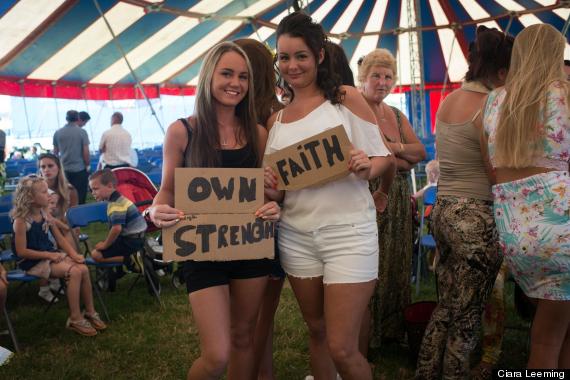Throughout November, The Huffington Post UK ran its Beyond Belief series, chronicling the remarkable lives of Britons who've taken on their faith to create a force for change.
![beyond belief]()
Religion has had a bad press in recent months, and with the ever-rising number of abuse cases in the Catholic church, the opposition of faith groups to gay marriage, the beheadings committed in the name of Islam by Islamic State, and the endless rounds of violence between Israel and the Palestinians, it is perhaps natural more people are starting to turn away from organised religion.
According to our own research, more than half of Britons believe that religion does more harm than good, with less than a quarter believing faith is a force for good, with more than 60% of Brits - living in a nominally Christian country - saying they were not religious at all.
Across the pond,
religion is said to be damaging politics, with both US parties imbibed with a sense of righteousness fueled by faith which can mean compromise is never on the table, especially if your
opponent is the "anti-Christ".
![world trade center]() Islamist group Al-Qaeda attacked the World Trade Center in New York on 11 September 2001
Islamist group Al-Qaeda attacked the World Trade Center in New York on 11 September 2001
But does religion deserve its bad reputation? We found
academic studies consistently challenge the link between religious teachings and war or extreme violence. “Religion, unfortunately, provides a useful cover and powerful motivator for the evil-hearted,"
Rachel Woodcock, an author and academic featured in our series, writes.
So if religion gets a rough ride, and morality goes "beyond belief", who are the people leading the charge for change?
The Huffington Post UK's Beyond Belief series profiled religious radicals who broke the mould, and were championing progressive values and challenging core components of traditional culture and dogma to find a place for faith in the modern world. And to explore the origins of faith, whether that is in God, in culture, in community, an inner spirituality or in other human beings. People who have stood up to the orthodoxy, and shattered the stereotype.
The HuffPost/Survation research which launched the month-long series showed people are no longer viewing religious people as morally superior. More than 55% of those surveyed said that atheists are just as likely to be moral people than religious people.
Beyond Belief profiled 12 amazing people who inspire us not because of their faith, but because of the positive action it drives them to take. Here's what we learned from them.
An inspirational faith can be in anything - not just derived from traditional religion
![ajahn]() Ajahn Khemadhammo, the 70-year-old ordained monk, is a leading force in British Buddhism
Ajahn Khemadhammo, the 70-year-old ordained monk, is a leading force in British Buddhism
Many of the religious radicals we profiled for Beyond Belief did not garner their inspiration solely from "God" in the most literal sense.
For Ajahn Khemadhammo, a former actor with Lawrence Olivier, who is now leading a Buddhist movement in prisons, inspiration comes from within, not an external, other-worldly being. “What became important was to try to understand myself, to understand life and what it’s all about. I wasn’t interested in being peaceful and happy, or anything like that – people come [to my hermitage now] wanting peace and happiness sometimes, but that never occurred to me,"
he says. "I didn’t feel that I wasn’t particularly happy. It was that knowledge and insight that really gripped me.
“I wasn’t required to believe something I didn’t understand. We don’t believe in God. It’s lovely."
Hannah Weisfeld, the Jewish pro-peace campaign who runs "two state solution" campaign group Yachad, also draws her inspiration from history and culture, rather than a traditional "God".
"The thing about support for Israel, the thing that gets lost in the conversation is that for a lot of Jews it’s about culture," she says. "Things like the revival of the Hebrew language [are] massive for Jews outside of Israel. The point is this: I actually think that it’s really important for non-Jews to hear that Zionism is not Israeli government policy."
Zionism, she says, has become warped from the real definition, which she says is "a belief in the right of the Jewish people to have a nation state."
And faith can also be connected to values beyond religion. For many who we spoke to, the faith they held was in humanity, beauty and in their relationships. "This belief in people underpins a lot of what I believe in and stand for - I’d also consider myself a Rawlsian [after the American philosopher John Bordley Rawls], which to me fits perfectly with humanism,"
says Lib Dem MP and self-proclaimed atheist Julian Huppert.
Inspiration can strike at anytime - and it can change everything
![light and life]() Girls before a meeting at a Light and Life convention
Jackie Boyd
Girls before a meeting at a Light and Life convention
Jackie Boyd, the head of the UK's largest gypsy church Life and Light,
found his faith behind a glue factory and used it to start major cultural reform and challenge fortune-telling and child marriage.
For
Simon Bass, who works to save children from Christian-perpetrated child abuse, it was the death of his parents that brought him closer to God, and a sign when he was out running. "There was tremendous sense of peace and acceptance. I just knew that God was real. People say 'how do you know?' You know it or you don't know it. I just had that sense that 'Yes, God, I know you are real'" he says. But more than just a strong sense of belief, Bass had an urge to put his faith into action.
Japjeet Kaur Khalsa, who was featured in our piece focussing people who have changed their religion, said it was also through hardship, this time physical, that she found her Sikh faith, having been born a Catholic. She experienced a deep sense of purpose through yoga practice. "I did feel some uncomfortableness at first with the use of the word 'God'. I thought 'I'm just here for health problems, not God'.
"But through experiences I had through that yoga practice, my perspective started changing. I started recognising the mantras as if I had heard them before. They couldn't have come from anything I knew then. Through meditation, I had experiences that my self didn't end with my body."
There's no such thing as a typical 'religious' person - and traditional faith can work hand-in-hand with modern life
![vicky beeching]() Vicky Beeching says she is happier than ever
Vicky Beeching says she is happier than ever
“I know what my relationship with God is," says
Vicky Beeching, the former Christian rock star who came out and became an LGBT activists. She is adamant that coming out later in life, aged 30, mean she was confident enough to know she had a strong theological basis to says she is both gay and Christian. But because there was no one to tell her that very thing when she was younger, that is what drives her now, to be that voice for others.
“There was no one at all, and that’s what motivates me now,”
she says. “Having someone say ‘this is ok’ and be a role model, was what I needed so badly. My life would have been so different, just a book or an article about what the bible really says about sexuality would have been gold dust."
Reform Judaism's Rabbi Laura Janner-Klausner, Britain's first female head of a faith, also says education and knowledge have given her the confidence to be part of Judaism's modernising force. “I am a Talmud scholar, I am a fluent Hebrew speaker, I know Israel inside out, my background is very much from the establishment. So, I think it’s very hard to marginalise me, though people try. I have no chip on my shoulder that I am ‘not as good’ as them,”
she says, of her Orthodox colleagues.
Usha Sood, the Hindu barrister who has taken on forced marriages and abusive dowry claims, says she is confident in her own progressive values, and her faith, to never waiver. "If I had been in my 20s I might have been nervous, but when you get older you just lose the fear,"
she says. "You are more life-experienced, and you also have an eye on the goal, which is that these children need help, and I’m going to say my piece.”
Spires London's Pamela Mhlophe is a staunch Catholic, but it is the compassion she draws from that faith that leads her to help street sex workers with birth control, with clean needles, even sometimes with abortion. "As much as I don’t personally believe in it, I want the women to make the right choice, and to know I will support their choice. I will never propagate faith to anybody,"
she tells us.
Having faith does not always mean being dogmatic.
Canon Andrew White, the Vicar of Baghdad, is prompted by his religious faith to call for further military force in Iraq, to fight the Islamic State onslaught, and to admit he was wrong about the first invasion. "I'm never as pious or bold as to say 'I'm not wrong',"
he says. "I was wrong when I said we should go into Iraq.
"I was wrong because it was left far worse than it ever was before. But we caused this mess. We must do our part to clean it up and to do that, we have to be there. I knew the regime of Saddam was bad but I didn't realise afterwards we had nothing planned."
Even those we interviewed who are atheists said that religious values, teachings and art were important to modern life. "Religion is full of poetry and magic and was key to all the great art humans created in the West up until the Enlightenment,
says comedian David Baddiel. "I don't think you can understand what it means to be human without understanding religion."
To challenge your own religious dogma can mean losing everything, or changing everything
![leyla hussein]() Leyla Hussein is challenging preconceptions about FGM, inside and outside her community
Leyla Hussein is challenging preconceptions about FGM, inside and outside her community
For those challenging the stereotypes within and outside of their faith, it can be tough. Her Muslim faith is the inspiration for
Leyla Hussein's anti-female genital mutilation campaign, which also challenges her own community to speak up more. "The idea that FGM is a Muslim issue is a myth and religious leaders should be speaking out to dispel this myth, yet the majority are silent,"
she says.
“They say, ‘You are shaming Somalis, why are you speaking out? Why are you telling people about our dirty laundry?’ My response is: “If it’s dirty, someone needs to wash it!'"
Likewise,
Asim Hafiz, the Muslim chaplain to the British army, met with strong resistance when he took on the role. "Everyone said to me, 'no, no, no, you can't work for the armed forces'. They didn't understand what the armed forces were about."
He, like Hussein, had to be the pioneer before attitudes could start to change. "It's been nine years now. It's become part of the furniture. It still raises eyebrows but it's rare now," Hafiz says.
On the other side of the coin,
Muslim congressman Andre Carson's faith challenges everything you might expect of a US politician from the Bible Belt. But he says they go hand-in-hand. "What you'll find about Midwesterners is that they're less concerned about what religion a person is and more concerned with their value system and whether they'll deliver,"
he says, adding that as a "Muslim that comes from the African American experience, [I am] more concerned with civil and human rights, with education, with the global economy, creating jobs and how to repair broken infrastructure. These are issues Midwesterners relate to."
Young people are far more tolerant of religion - and it's young people of faith who are breaking the mould
![ruth yimika awogbade]() Ruth Yimika Awogbade started running Magnify events when she was 19
Ruth Yimika Awogbade started running Magnify events when she was 19
Our survey found young people are actually more likely to have a positive view of religion. Around 30% of 18-24 year old believe religion does more good than harm, compared to just 19% of 55-64 year-olds.
But they aren't so keen on sitting in a drafty church, and they've got little patience for the intolerances of traditional dogma. "We’ve had a few atheists and gay people come to our society," says
Tyelle Render, one of the founders of a "new" kind of university Christian society Discover Life. "You do get sects where they don’t accept these people but it’s not how God teaches us. When they come to our society we say we love them and we accept them for who they are."
Some have even taken their faith into hitherto unknown quarters.
Ruth Yimika Awogbade began her fashion magazine Magnify for modern females interested in feminism and faith, when much of the religion seems at first glance to come into conflict with what modern women want. "I wanted to give women the chance to see how faith could have a positive impact in every area of our lives,"
she says. "When I discovered my own faith it felt authentic and relevant to my life as a young woman and I wanted to share that in an engaging and unpressurised way."
Social media is also a new way to talk about faith, and for young people to debate their beliefs and find inspiration, even if they don't find God.
We asked people to 'tweet their faith' and the response was massive - #HPBeyondBelief was used over 1,500 times.
These are the ways people draw inspiration from their faith that goes 'beyond' just a belief.
BEYOND BELIEF

















